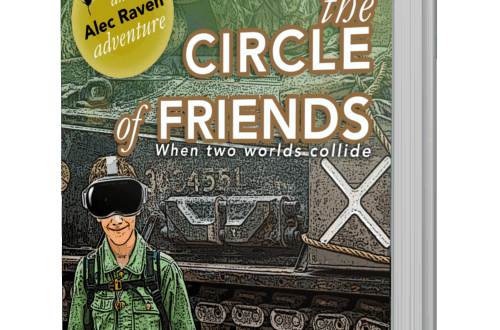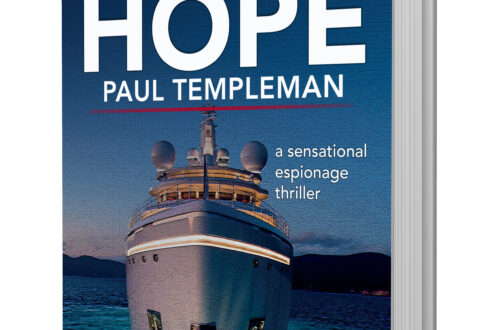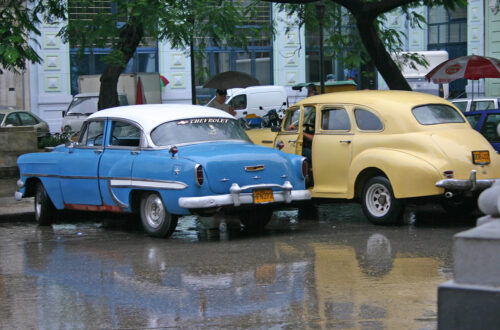Alec was thinking about skin. How was it formed? Was it just packaging for bones? He pinched the flesh on the back of his hand, watching it spring back. Even as Mr Parsons paced down the rows of desks in his brown leather brogues he couldn’t trust his thoughts not to wander. Somewhere beyond the classroom a desk banged shut.
‘Does anyone know what a synonym is?’ said Mr Parsons in a raised voice.
He knew what a synonym was but he shrank inside. Then a finger pointed and he was done for.
‘Puddleton,’ said the teacher, singling him out ‘Alec Puddleton, isn’t it? Tell us what it is, Puddleton.’
Alec’s skin tingled where it made contact with the hard wooden seat—what made it do that? He looked up. ‘A word that has the same meaning as another word, sir.’
Somebody said: ‘Ooh… a Smart Alec,’ and a cacophony of laughter arose.
Mr Parsons waited for it to subside. Alec felt a pang in his stomach. He could feel tears welling up but blinked them away. Never say anything, he told himself.
‘Smart Alec,’ repeated Mr Parsons. ‘Can anyone provide a synonym for the word smart?’
A few hands went up.
‘Intelligent,’ said a boy with a severe look.
‘Clever,’ said a small girl.
‘Brainy,’ said a boy on the back row.
‘Bright,’
Mr Parsons was writing the words up on a whiteboard that spanned half of the wall.
‘Elegant,’ said somebody else.
‘Witty.’
‘I think,’ said Mr Parsons finally, ‘that we’ve adequately described young Puddleton.’ Somebody laughed. ‘Now I’m going to set you an exercise…’ and he set the class to work on prepositions.
Alec thought so deeply in class he was in danger of drowning. His thoughts ploughed channels his conscious mind didn’t know it made. He broke surface to a harsh reality only when a teacher called his name. The shock would make him start and shudder, and produce a stuttering response so he was allowed to wear ear defenders against incursions like that— as well as to shield himself against the sounds of shuffling feet, the scrape of chairs, the click of the hands of the wall clock, and the relentless murmur of his classmates.
Often his thoughts embarked on unexpected detours. The ticking of the clock for instance. What if there were a way to make a car run on clockwork? What if every tiny movement of the steering wheel could be harnessed to produce energy? Another world-saving concept. Ideas like this came to him all the time. Would this one make him a billionaire? The idea rotated in his mind like a cog, until he noticed instead the way the branch of a cherry tree brushed against the window with its papery leaves and gnarled fingers, like it was beckoning for his attention. From where he sat he could see tiny scratches on the glass that made him unaccountably uneasy, like a breach of perfection. He wondered whether they might polish out or whether they would have to replace the glass? Would they cut back the tree to stop it happening again?
Beyond Alec’s thought bubble, Mr Parsons had written a list of prepositions on the whiteboard with a red marker pen and performed a cursive flourish that might power clockwork. Alec knew if he lifted his headphones the squeak of the pen would set his teeth on edge. The teacher leaned his willowy form into the whiteboard and pressed hard as he wrote the word ‘Beside…’
…beside Alec sat a boy whose name he didn’t know, leaning on his elbows head in hands. He had unruly hair like an untamed garden and his face betrayed his struggles with prepositions. Alec looked around at the arched backs of the other children, bowed over their exercise books and wiggling their pens as they wrote, mostly unknown to him. Along the row of desks, Alec’s eye strayed to Penny, a girl from his old school, who caught him looking and stuck out her tongue, shaking her head so her tightly cut bob fluttered. Penny used to whine to the teachers that he was staring at her, but he never was. He didn’t like her small nose and spiteful eyes and the curled up rose petal tongue that taunted him. He didn’t like that she had an untidy array of felt pens on her desk with mismatched caps. He widened his eyes in an uncertain response, seeking meaning, but the meaning and the connection were already lost and it set him squirming inside. Why did she do that? He was just looking and not staring, and when did a look qualify as a stare?
Mr Parsons drew himself up and surveyed his class. Alec thought he was a little scary: he reminded him of black and white pictures he had seen of a wartime Prime Minister—was it Chamberlain? Mr Parsons was looking at him now, and he felt his face become hot as all heads turned. The teacher was gesturing to remove his ear defenders. When he did there was a burst of sound, like opening the window of a moving car.
‘Settle down,’ ordered Mr Parsons. He had a calming, unhurried tone. Alec thought he sounded like a doctor. There was excitement in the air like the last day of term—except today was the first day of term. The teacher examined his watch, switching back his cuff with a brisk movement. ‘The bell will go shortly,’ he predicted, tapping the face of his watch. He poured himself a glass of water from an aluminium decanter on his table and took a tentative sip. ‘I want to thank you all for your attention this morning. I hope I’ve been able to do justice to your first lesson at Bridlewood Academy. Something I like to always ask on a first day of term: which of you have enjoyed your lesson today?’
Not wishing to draw attention, Alec’s palms stayed flat on the table. Penny had her arm straight in the air and so did a few others. Alec thought he detected the smell of chalk dust but there were no blackboards in sight. Mr Parsons concealed a smile beneath a wiry toothbrush moustache as he looked around the classroom taking note but not counting the lifted arms.
‘Welcome to Bridlewood,’ he said, and the bell jangled and chairs were scraped aside, bags packed, and a swell of students headed for the door. Mr Parsons loomed before Alec’s desk as he rose to leave. ‘A word, Puddleton please, before you float off.’
Alec Puddleton gulped back his nerves. He was tall for a twelve year old but Mr Parsons was a giant, towering above him. There was no shadow in the classroom but even so he felt he stood in the shadow of the teacher, who wore a sober brown suit of a kind Alec had never seen before. He could smell cinnamon.
The classroom had emptied, and there was only Alec and Mr Parsons, who had a kind of baked in humour beneath his moustache that Alec would later realise was a permanent characteristic.
‘Careful to read the files of all my new pupils,’ said Mr Parsons, truncating the phrase as he perched himself on the edge of his table. ‘I see you’re something of a maths prodigy?’
‘Is that what it says,’ sir?’
‘Diagnosed autistic, I read that too.’
A gnawing in his stomach. The world knew. Never a fresh start. ‘Yes, sir.’
’Taught a whole lot of autistic children. I won’t have it used as an excuse. Just so you know.’
Alec counted off the floor tiles (grey, and ingrained with streaks of shoe polish of decades of year-groups). He shook his head.
‘Some of my best pupils have been autistic. But some play dumb at first. Take me for a dumbster myself. You’re not going to be one of those, are you, Puddleton?’
‘No sir.’
‘No excuses then, agreed? You’re a bright one—I can always tell.’
‘Thank you sir. I’ll try not to make excuses.’
Mr Parsons looked down on him in silence for a few moments and Alec could feel his eyes. ‘Off you go then,’ he said with a nod towards the door. ‘Welcome to Bridlewood.’
#
After Alec left the classroom he stood in the wide, whispering corridor with his schoolbag dangling from his shoulder, trying to grasp an afterthought that had occurred to him, but was just out of reach. Not about prepositions but about where his next lesson was, after the break. He was nervous about setting out alone into the vast school and finding his way. It was French next. He would go back and ask for directions.
He pushed at the classroom door. Two older children blustered past in the corridor.
‘…friends on Facebook,’ one of them was saying. ‘He’s in a Call of Duty team.’ They hefted their bags in passing.
Alec took a tentative step into the room, which was silent and still. A chair lay on its back, tipped over in the rush to leave the lesson. It looked forlorn. The cherry tree still rubbed its back on the window pane and the sun cast bright angular shapes across the classroom floor. Parallelograms, observed Alec. The clack of the minute hand from the clock on the wall seemed harsher than before.
Where was Mr Parsons?
The door to a cupboard was open a few inches and Alec paced almost on tiptoe across the room to peek inside. Stacks of paper and exercise books and two unopened boxes of copier paper. The smell of chalk dust and cinnamon was stronger. A broom was propped against the wall. On a shelf was an angular device with a long neck attaching a lamp, beneath a thin layer of dust. Two unopened boxes of white chalk. The empty classroom was sinister and pressed at his back. There was no sign at all of Mr Parsons. How had he left without being seen? How did the murderer leave the locked room? His favourite writer MG Leonard would know the answer.
He entered the cupboard. There was a brown overall hanging from a peg on the facing wall. He kept one hand on the door, fearful of being locked inside and went inside as far as he dared. Mr Parsons wasn’t there. He tried switching on the light and dust mites rose and danced in the yellow light. Why did they always rise and never fall? Had Mr Parsons disappeared to the place where the dust rose?
#
Bouncing off the high ceilings the clatter of trays and the clash of cutlery jarred Alec’s senses and made him clamp his jaw tight. He wanted to wear his ear defenders but he didn’t want to seem like a freak to the older students. Instead he joined the queue and selected a chicken breast and some fries from the aluminium dishes under the warming lamps. A tall woman in white overalls smiled encouragement and offered him some carrots. She had a creased but amiable face, and although he didn’t like carrots he took some to please her.
The sound of chattering was like the noise of geese, echoing around the cafeteria. He steeled himself to keep focus. He put a plastic cup of water on his tray and was careful not to spill it as he found himself a table alone. He went back once, feeling foolish, to find himself a knife and fork, inspecting the cleanliness of the cutlery and making sure he found a set that were shiny and not bent.
When he returned to his table another boy had sat himself opposite, his plate piled high with food.
‘Hi,’ said Alec, sitting down with a sinking feeling. He thought he recognised the boy from Mr Parson’s class.
The boy pointed to his mouth which was full, and he grunted, chewing fast.
‘Hi,’ he said at last. ‘I know you. I remember you’re the Smart Alec. From this morning, yes?’
The boy had a trace of an accent. He was full faced and had an intense air about him.
‘Not smart. Not really.’
‘I say you’re smart,’ said the boy. ‘I know this because I am also smart.’
Alec smiled. ‘That’s good.’
‘I am Igor.’
‘Nice to meet you.’
‘Yes,’ said Igor, shoving more food into his mouth. ‘It is.’
‘You’re not English?’
Igor thought about this. ‘No,’ he said, after careful consideration, continuing to eat.
Alec cut into the chicken and found it was overcooked, just the way his mother would want it. He could smell cabbage, but when he looked he hadn’t found any. ‘So where are you from?’
‘I’m Ukrainian,’ said Igor.
Because of the war?’ said Alec, ‘I’m sorry,’
Igor shrugged. ‘You didn’t start it. No need to be sorry.’ He flashed him a smile that wasn’t fractured or fragile like Alec might have expected from a refugee. ‘Anyway, I like it here. It’s not so bad. My father is a soldier. Everybody’s got to be a soldier in Ukraine today. I don’t ever want to be a soldier. I want to fight for a world where people don’t have to fight.’
‘Slava Ukraine,’ said Alec, because he’d read it somewhere.
The boy sighed. ‘People always say this,’ he said.
Alec widened his eyes. ‘Don’t you like it then? Glory to Ukraine?’
‘My grandmother is Russian. She says we should all be ashamed of ourselves. Like children, she says. Glory this. Glory that. Not much glory in dying in a ditch, she says.’
‘Are you Russian then?’ said Alec.
‘My mother was born in the Soviet Union. She grew up in Ukraine—in Karkhiv. At home we speak only Russian. My passport says Ukrainian. Who cares? This is what I say.’ He said this between mouthfuls. ‘I play computer games. What do you do?’
‘I don’t know. Nothing much, I suppose. My brother plays computer games.’
‘Roblox. On Roblox you can build worlds. I like to build. The world needs to build more, not break.’
‘You’re right.’ Alec picked at his food. ‘I build worlds too, but only in my head. I heard about Roblox.’
‘If you don’t want the chicken I will eat it,’ said Igor, eying Alec’s plate with appetite.
‘No, no. It’s just very dry.’
Igor scraped the last of his meal onto his fork. ‘If you change your mind…’
A procession of students passed their table, some with full trays and some with empty ones. Some, Alec noted, were almost adults. A few of the boys had incipient growth on their chins. Not like his old school where he was one of the tallest. He was glad Igor was here. Igor was about the same size.
‘Do you play computer games?’ pressed Igor.
‘No. But I read a lot. And I draw.’
‘Hah! Smart Alec,’ and Igor laughed at his own joke and made a pointing gesture with his fork.
‘Where do you live?’ asked Alec.
‘With a sponsor.’ Igor shook his head. ‘That’s what my mother says. What is sponsor?’
‘I’ve read about it, but only in the newspaper my dad buys, which is not very good. Sponsors are families that are taking in refugees to live with them until the war is over.’
‘Do they get money for this?’
‘I don’t know. Maybe some of them do it just to help out.’
‘I bet they get money for this. Nobody does anything for nothing. Not in Ukraine and not here either.’
‘What’s Kharkiv like?’
Igor hesitated. ‘Broken. It’s all broken up. One day our apartment exploded. All gone. All my things. My medals from my grandfather—not for military but for working hard. He was a hero. Also my football kit. Lucky I still have my computer.’
Alec thought of his small home and his bedroom packed with books. A threadbare teddy bear from when he was a kid. Pictures on the wall that he had drawn. How would he feel? Could he shrug it off like Igor? He couldn’t imagine his dad going to fight.
‘What was it like? Living In Kharkiv?’
Igor regarded him with a shrewd expression. ‘Noisy.’ he said.
‘Because of the bombing?’
‘Because of the traffic. Rush hour—that was insane.’
Alec felt the heat rising. ‘Stupid…’ he said. Some reflex made him pull a fact out of the air to relieve the tension. ‘Did you know the longer road in the world goes from Alaska to Argentina?’
Igor stopped eating and frowned. ‘I didn’t know that,’ he looked bewildered.
‘It’s something I know. Interesting, right?
Igor gave a dismissive shake of his head and put his knife and fork together, leaning back in his chair at a precarious angle, still with an eye on Alec’s half-dissected chicken. ‘What did you think about Mr Parsons?’
‘He seems OK.’
‘Humph,’ said Igor. ‘Want to know what I think? I think Mr Parsons, he is a Russian spy.’
Alec laid his cutlery down. Was he joking? Poking fun at him? ‘A spy?’
‘A Russian spy. Take it from me. Is there dessert?’
‘I think I saw some pudding. What do you mean, a spy? Spying on what?’
‘Mr Parsons spoke to me in Russian. Speaks like he was born in Moscow not like some Englishman from London. He was asking me a lot. About home. About Kharkiv.’ He tapped a finger on the table as if for emphasis. ‘And about my father. Asks much about my father. Where is he based? What does he do in the army. This is very suspicious for me.’
‘What did you say?’ said Alec, remembering Mr Parson’s unexplained vanishing act.
Igor shook his head slowly. ‘I don’t tell him anything. Him with perfect Russian.’ He snorted.
‘But what would he spy on? In a school?’
‘I don’t know. But we should take care, right? With a Russian spy pretending to be a schoolteacher.’
#
Mrs Ombugo would probably not fit Igor’s profile of a Russian spy, thought Alec in Maths class where he had been placed alongside a large round bellied boy with a permanent grimace, whose elbows occupied too much space. Mrs Ombugo was writing in red marker pen long division sums on the whiteboard in an unhurried hand. Two girls whispered on the back row, and pupils squirmed and creaked in their chairs. The teacher turned to face the class last, and Alec cowered inside himself, his eyes roving around the maths themed posters on the walls.
‘Harris,’ said Mrs Ombugo. Her lips were tightly drawn but Alec thought she had kind eyes in wrinkled sockets.
‘Yes, miss,’ said the boy beside Alec.
She pointed to the board. 24,851/358. ‘Tell us how you would go about solving this division.’
Harris wriggled. ‘Start with removing the zeros?’
Alec didn’t join in the laughter that spilled around the class. He willed his face to be still.
‘There are no zeros,’ said Mrs Ombugo. ‘Anyone else want to have a go?’
A girl with a severely bound ponytail and a panda-shaped ink stain on her school shirt rose to the challenge. She stumbled over the numbers and petered into silence with a crestfallen look. Alec felt her pain. Then Mrs Ombugo pointed her chin at him and her kind eyes were fixed on him.
‘Any ideas?’ She waved a braceleted hand at him.
Alec shrugged. ‘The answer is 69.4162,’ he said, steeling himself for misery. He felt Harris’s glare.
Mrs Ombugo’s eyes widened. ‘How did you arrive at that answer?’
‘It was there all along, miss. I just sort of uncovered it.’
‘Do you have a calculator?’
‘No miss. I have an abacus in my head.’
Harris said ‘Ha, ha.’ The rest of the classroom was silent, expecting the worst. Teachers have combusted for less. Mrs Ombugo’s eyes swept over the class as if seeking conspirators. They landed again on Alec.
‘An abacus?’ She repeated, intrigued and not upset.
‘Miss, it’s the way I do sums. I’ve got an abacus at home but I don’t use it any more because it’s in my head. In Japan lots of kids can do it. I’ve seen videos on YouTube.’
‘How did you learn to do this?’
‘I just learnt it. I asked my dad to buy me an abacus. It’s easier for me to do it this way.’ He enjoyed the symmetry and the sliding collisions of the beads on the metal frame. In his head he could hear the tick of the beads as they counted off the numbers, like a metronome for arithmetic.
‘You’ll still need to show your working out. For exams.’ Mrs Ombugo thought for a moment and nodded. ‘See me afterwards, Puddleton. I’d like to hear more about your methods.’ Then she turned to the rest of the class and Alec exhaled, realising he’d been holding his breath. A rough shoe nudged his foot. Harris slipped him a small folded square of paper across the desk which Alec unfolded with a quick sidelong glance, swallowing his anxiety. The note read: ‘you’re dead.’






